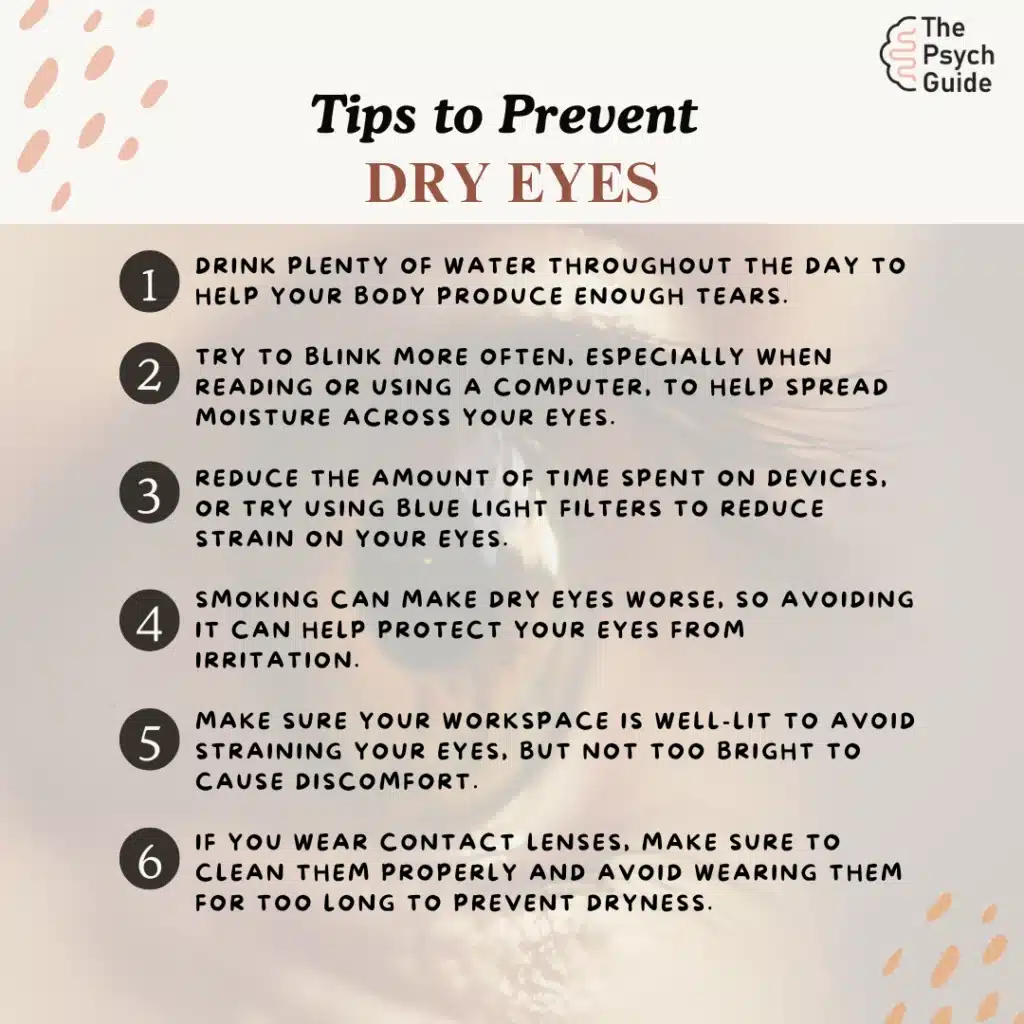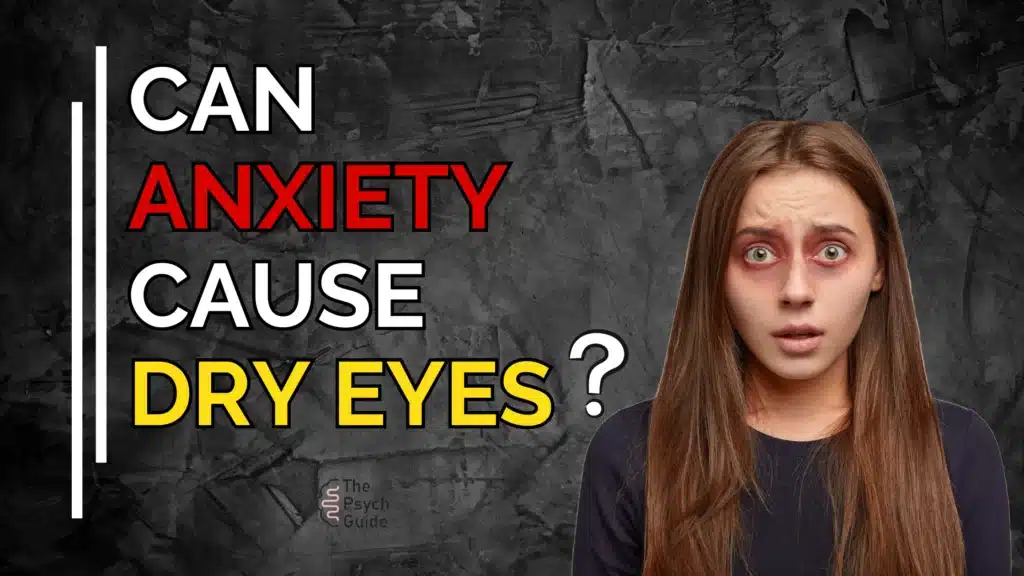Have you ever noticed your eyes feeling dry and uncomfortable during stressful moments? Well, it’s not just a coincidence—your mental state can have surprising effects on your body. These effects might lead you to think, Can anxiety cause dry eyes? This question might intrigue you as anxiety has very unusual physical symptoms.
When anxiety takes over, it doesn’t just affect your thoughts—it can impact your body in ways you might not expect. From increased tension to changes in how your body functions, anxiety has a way of showing up in surprising forms, including physical discomforts like dry eyes. Understanding this connection can help you see how closely linked your mental and physical health truly are.
In this blog, we will explore “Can Anxiety cause dry eyes” and how it can impact your overall well-being including the connection between anxiety and dry eye disease. We’ll discuss the symptoms of anxiety-related dry eyes, available treatments, and simple self-help techniques. Plus, we’ll recommend some insightful books that can guide you in managing anxiety and its effects. Let’s dive into understanding this mind-body connection and how to take care of yourself.
Table of Contents
ToggleWhat is Dry Eye Disease?
Dry eye disease is a condition where your eyes don’t make enough tears or the tears you produce aren’t good at keeping your eyes moist. This can lead to feelings of dryness, irritation, and discomfort in your eyes. It can happen for many reasons, like spending too much time looking at screens, certain health conditions, or even changes in the weather. When your eyes don’t stay properly lubricated, it can make everyday activities like reading, driving or routine tasks harder.
Symptoms of Dry Eyes Disease
The following are the most commonly occurring symptoms of dry eye disease:
- Feeling Gritty or Dry: Your eyes might feel like there’s sand or something stuck in them, causing discomfort and a constant dry sensation.
- Red or Bloodshot Eyes: You may notice your eyes looking redder or more irritated than usual, as the lack of moisture can cause inflammation in the eye.
- Burning or Stinging: Your eyes might have a burning or stinging sensation, similar to the feeling when you get something irritating in your eyes.
- Itchy Eyes: Itchiness can occur, making you want to rub your eyes, but doing so may make the dryness worse.
- Sensitivity to Light: Bright lights, like those from the sun or screens, might feel painful or uncomfortable because your eyes aren’t properly lubricated.
- Blurry Vision: Your vision may become blurry, especially after staring at something for a while, but it usually improves when you blink or rest your eyes.
- Watery Eyes: It may seem strange, but your eyes might water excessively as they try to make up for the dryness, leading to a cycle of irritation and watering.
- Tired Eyes: Even if you haven’t been doing much, your eyes can feel tired or heavy, making it harder to focus or keep them open.
- Pain Around the Eyes: You may experience a dull ache or discomfort around your eyes and on your eyelids, as the lack of moisture can cause surrounding areas to become tender.
- Trouble Wearing Contact Lenses: If you wear contact lenses, they might feel uncomfortable or hard to keep in due to the dryness, leading to irritation or even the need to take them out earlier than usual.
Now let’s move forward and answer the main question “ Can anxiety cause dry eyes”?.

Can Anxiety Cause Dry Eyes?
Anxiety is often associated with mental and emotional distress, but did you know it can also affect your physical health? One surprising symptom linked to anxiety is dry eyes. While it might seem like an unrelated issue, the connection between anxiety and dry eyes is more significant than you might think.
You might not expect it, but anxiety can actually leave your eyes feeling dry and irritated. Studies show a significant correlation between anxiety disorders and the development or worsening of dry eye disease.
A 2018 study found that anxiety and depression are linked to the way people experience dry eye symptoms but they don’t necessarily cause the condition. The research suggested that psychological distress could intensify the discomfort experienced by dry eye patients.
In 2019, another study found that psychological stress, like anxiety, was linked to an increase in dry eye symptoms. Researchers suggested that stress might make dry eye symptoms feel worse.
In 2020, a study confirmed that higher stress levels were associated with more frequent and severe dry eye symptoms, especially in people who used computers for long periods. It showed that the combination of stress and lifestyle habits like screen time could be a factor.
A study from 2021 went further, showing that anxiety sensitivity could affect how people experience dry eye symptoms. This means that individuals who are more sensitive to anxiety might feel their dry eye symptoms more intensely.
Moreover, research in 2022 suggested that people with high levels of stress and anxiety were more likely to report dry eye disease. It also pointed out that treating anxiety and improving stress management could help reduce the severity of dry eye symptoms.
All of these studies together highlight how stress and anxiety can contribute to the development and worsening of dry eyes. It further tells us that managing and reducing stress and anxiety may lead to improvements in dry eye symptoms.
How Can Anxiety Lead to Dry Eyes?
Many people experiencing chronic anxiety report symptoms of dry, irritated, or burning eyes. But how does anxiety lead to dry eyes? Anxiety triggers physiological responses in the body that can directly and indirectly contribute to eye discomfort. Here’s how:
1. Tear Production Gets Disrupted
A study showed that patients newly diagnosed with anxiety or depression had lower tear production and faster tear evaporation compared to healthy individuals, showing a link between dry eye disease and mental health.
When you’re anxious, your body is on constant high alert, which can mess with your tear production. The stress hormones released during anxious moments can interfere with the glands that create tears, leaving your eyes feeling dry and uncomfortable.
2. Muscle Tension and Less Blinking
Anxiety causes your muscles to tense up and you might feel pain in your muscles, especially around your face and eyes. This tension can make you blink less, and blinking is important for spreading tears across your eyes. When you blink less, your eyes dry out more quickly, making them feel scratchy and irritated.
3. Shallow Breathing Dries Out Your Eyes
When you feel anxious, you might start breathing faster or more shallowly (hyperventilation) without even realizing it. This can dry out the air around your eyes, leaving them feeling irritated and sometimes even burning.
4. More Sensitivity to Things Like Wind or Air Conditioning
Anxiety can make you more sensitive to things like wind, air conditioning, or even smoke. Your eyes are more likely to feel dry and irritated when you’re already anxious, especially in environments that trigger discomfort.
5. Sleep Problems and Dry Eyes
Anxiety often affects how well you sleep and can cause problems like insomnia and sleep apnea. This lack of rest can prevent your eyes from refreshing themselves during the night. When your eyes don’t get enough recovery time, they can feel dry and uncomfortable the next day.
6. Hormonal Changes and Drier Eyes
Chronic anxiety can throw your hormones out of balance, especially by raising cortisol levels. These changes can affect your tear glands, making your eyes even drier.
So all these factors answers our question “Can anxiety cause dry eyes?”. While anxiety might not be the sole cause of dry eyes, it certainly plays a role in making the condition worse.
Other Causes of Dry Eyes Disease
Anxiety is not the only cause of dry eyes. There are other most common physical and environmental causes of dry eyes:
- Aging
As you get older, your body might produce fewer tears, which can make dry eyes more common. - Health Conditions
Certain conditions like diabetes, arthritis, or thyroid problems can affect your tear production and lead to dry eyes. - Medications
Some medicines, like antihistamines, decongestants, and certain blood pressure drugs, can reduce tear production. - Spending Too Much Time on Screens
Looking at screens for long periods can cause you to blink less, which means your eyes don’t get the moisture they need. - Dry or Windy Environments
Being in dry, windy, or smoky areas can dry out your eyes and make them feel uncomfortable. - Contact Lenses
Wearing contact lenses for a long time or not cleaning them properly can lead to dryness and irritation. - Eye Surgery
Surgeries like LASIK can temporarily affect your tear production, leading to dry eyes. - Hormonal Changes
Changes in hormones, especially during pregnancy or menopause, can lead to reduced tear production. - Dehydration
Not drinking enough water or being dehydrated can make your eyes feel dry because your body isn’t producing enough moisture. - Allergies
Allergies can irritate your eyes and affect tear production, causing them to become dry and itchy.

How to Treat Anxiety-Induced Dry Eyes
The following treatments can help manage anxiety-induced dry eyes:
1. Cognitive Behavioral Therapy (CBT)
Therapy can help manage anxiety and reduce its physical impact on your eyes.
How it works: CBT helps address the root causes of anxiety by changing negative thought patterns, which can alleviate anxiety-related dry eye symptoms.
Effectiveness: Reducing anxiety through therapy can help prevent dry eyes from worsening over time.
2. Stress Management Techniques
Reducing anxiety is crucial in treating dry eyes caused by stress.
How it works: Techniques like deep breathing, meditation, and progressive muscle relaxation help calm the nervous system and reduce the impact of stress on your eyes.
Effectiveness: By managing anxiety, you can help restore your body’s natural moisture balance, reducing dryness in the eyes.
3. Use Lubricating Eye Drops
Artificial tears can offer relief from dryness and discomfort.
How it works: Over-the-counter eye drops hydrate the eyes, providing moisture and alleviating irritation.
Effectiveness: These drops provide quick, temporary relief, allowing your eyes to feel more comfortable and less dry throughout the day.
4. Take Frequent Breaks from Screens
Staring at a screen can worsen dry eyes, especially when you’re anxious.
How it works: Take regular breaks from screens by following the 20-20-20 rule: every 20 minutes, look at something 20 feet away for at least 20 seconds to give your eyes a break.
Effectiveness: Regular breaks help relieve eye strain and keep your eyes from becoming drier, especially during periods of heightened anxiety.
5. Stay Hydrated
Proper hydration is essential for healthy tear production.
How it works: Drinking enough water ensures your body can produce enough tears to keep your eyes moist.
Effectiveness: Staying hydrated helps maintain eye moisture and reduces dryness caused by anxiety or stress.
6. Use a Humidifier
A humidifier can help maintain the moisture level in the air, preventing your eyes from drying out.
How it works: It adds moisture to dry environments, helping to prevent your eyes from becoming dry and irritated, especially during colder months or in air-conditioned spaces.
Effectiveness: A humidifier can significantly reduce dryness and irritation in the eyes, especially when stress is a contributing factor.
7. Wear Protective Sunglasses
Outdoor environments can make dry eyes worse, especially in windy conditions.
How it works: Sunglasses protect your eyes from the wind, dust, and bright light that can exacerbate dryness and irritation.
Effectiveness: Wearing sunglasses outdoors helps shield your eyes from environmental stressors that can increase dryness.
8. Omega-3 Fatty Acids
Omega-3s have anti-inflammatory properties that can benefit eye health.
How it works: Omega-3 fatty acids, found in foods like fatty fish or supplements, help improve tear production and reduce inflammation in the eyes.
Effectiveness: Incorporating omega-3s into your diet may help reduce dry eye symptoms, especially when anxiety contributes to the condition. In 2014, this study
found that omega-3 supplements can help with tear production and eye moisture.
9. Consult with a Healthcare Provider
Regular check-ups can help track your eye health and manage anxiety-related symptoms.
How it works: A healthcare professional can assess your eye health and suggest treatments that address both the physical and psychological aspects of dry eyes.
Effectiveness: Regular check-ups ensure that both anxiety and dry eye symptoms are managed effectively, leading to better eye health.
Self-Help Books
The following self help books will help you find answer to “ Can anxiety cause dry eyes” and further elaborate on its effective management.
Dino Cynova’s Say Goodbye to Dry Eyes reveals how anxiety can reduce tear production, worsening dryness and irritation. He offers practical stress management techniques to help reduce the impact of anxiety on eye health.
Steven L. Maskin’s Your Dry Eye Mystery Solved highlights the connection between anxiety and dry eyes. He explains how stress can lower tear production and provides simple solutions to manage both anxiety and dry eye symptoms.
In The Dry Eye Remedy, Robert Latkany shows how anxiety can worsen dry eyes by decreasing moisture production. He offers practical tips on stress management and treatments to help alleviate discomfort and restore eye health.
Platforms Providing Therapy and Support
Here are the three most popular websites that provide online therapy and support to those who are suffering from anxiety disorders.
This is an online platform that provides individual and couple therapy. They have an online team of consultant therapists, cognitive behavioral therapists, and practitioners who collaboratively work to help people in need of emotional support.
This is another very credible online platform that provides therapy services to individuals suffering from any kind of anxiety disorder.
This platform claims that 85% of their patients feel better within 12 weeks. They are providing a team of psychiatric providers, therapists, and techs custom-built for anxiety and depression care.
Conclusion
In conclusion, the connection between anxiety and dry eyes is real, and it’s important to understand how stress and dry eyes can affect your daily life. While anxiety itself may not directly cause dry eyes, the stress it triggers can lead to symptoms like dryness, irritation, and discomfort in your eyes. By managing anxiety through relaxation techniques, staying hydrated, and using the right treatments, you can reduce the impact of anxiety-induced dry eyes. If you’re wondering, “Can anxiety cause dry eyes?” The answer is yes—stress and dry eyes are often linked, and taking steps to address both can greatly improve your comfort and well-being.
Frequently Asked Questions
The following are some of the frequently asked questions apart from “Can anxiety cause dry eyes?” but are equally important in understanding the connection between mental health and eye health.
- Does having dry eye disease increase the risk of anxiety or depression?
Yes, a 2014 study found that people with dry eye disease (DED) are more likely to also experience anxiety and depression. The study showed that patients with DED were 2.8 times more likely to have anxiety and 2.9 times more likely to have depression compared to those without DED. This means that there is a bidirectional connection between dry eyes and mental health issues.
- Can anxiety cause my eyes to feel dry?
Yes, anxiety can cause your eyes to feel dry. When you’re anxious, your body can produce fewer tears, leading to dryness, irritation, and discomfort in your eyes.
- Can stress and dry eyes get worse over time?
Yes, if anxiety and stress are not managed, they can make dry eye symptoms worse. Chronic stress can lead to more frequent dryness and discomfort in your eyes.
- What can I do to prevent dry eyes from anxiety?
To help prevent dry eyes from anxiety, try relaxation techniques like deep breathing, take breaks from screens, stay hydrated, and use artificial tears to keep your eyes moist.
- Can anxiety cause chronic dry eyes?
Yes, if anxiety is ongoing and not managed, it can contribute to chronic dry eyes. Prolonged stress can continuously reduce tear production, leading to long-term dryness and discomfort.
- Should I see a doctor if I have dry eyes from anxiety?
If dry eyes become a regular problem, it’s a good idea to talk to a doctor. They can help you find the right treatments for both anxiety and dry eyes to improve your comfort.

